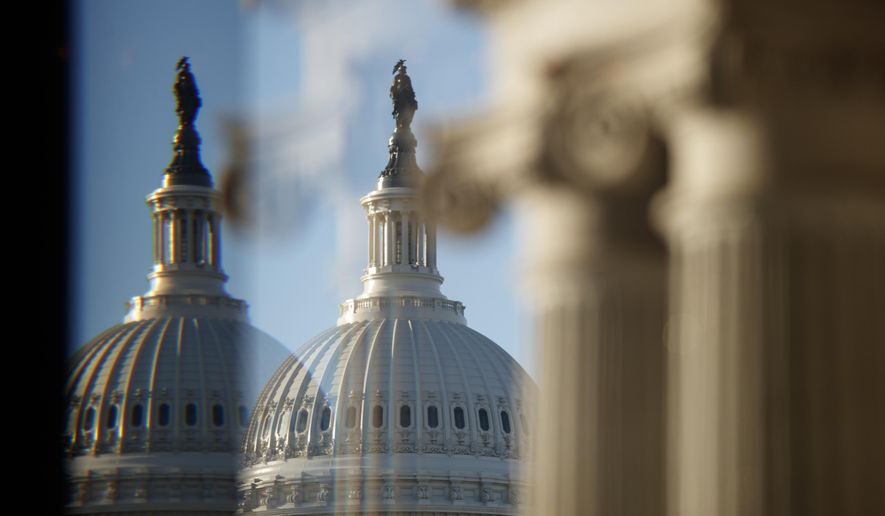With a year of the new tax system under their belt, members of Congress are pushing fixes they say are needed to fine-tune things, ranging from permanently extending the individual tax cuts to making more minor changes that created untended consequences for major interest groups like retailers.
Some proposals are partisan non-starters in an era of divided government, such as Democrats’ calls for a partial repeal, and GOP demands to go the other way and make all the cuts permanent.
Other plans are bipartisan, such as one from Northeastern lawmakers to restore full deductions for state and local taxes, known in the tax community as SALT. Wealthier residents in high-tax states — mostly Democrat-run — have howled this year over the $10,000 deduction limit imposed by the 2017 tax overhaul.
“The double taxation grenade last Congress was lobbed at New Jersey and New York by the Moocher States,” said Rep. Josh Gottheimer, New Jersey Democrat. “Now it’s time to work across the aisle, end double taxation, and restore the SALT deduction.”
Mr. Gottheimer and Rep. Lee Zeldin, New York Republican, said this week they’re working on legislation that would fully pay for restoring the deduction by closing unspecified loopholes, and that they wouldn’t have to resort to increasing the new, lower individual and corporate tax rates to make up the difference.
The two lawmakers are not likely to get very far.
A spokesman for Senate Finance Committee Chairman Chuck Grassley, Iowa Republican, said his panel doesn’t have plans to revisit the SALT issue, saying it makes no sense for federal taxpayers to subsidize high-tax states.
Most Republicans say the law is working just fine, even if voters don’t feel it yet, and that it’s time to expand upon the benefits.
Sen. Ted Cruz, Texas Republican, is pushing legislation to cancel the planned sunset of the individual income tax rate cuts and expanded standard deduction. The GOP had to end those tax breaks early in order to stay within a $1.5 trillion limit.
Meanwhile, a broad array of lawmakers from both parties have also pushed legislation recently to fix the so-called “retail glitch” in the law.
Because of a drafting error, retailers and restauranteurs now have to write off certain expenses associated with renovating or making improvements to their facilities over the course of 39 years — rather than immediately in some cases, as the law intended, or even 15 years under the old system.
“So instead of getting better cost recovery treatment under the new tax law, it actually ended up getting much worse cost recovery treatment as businesses now have to take deductions for those improvements over 39 years, instead of immediately,” said Erica York, an economist at the Tax Foundation.
That’s among a series of what Republicans call “technical corrections” they want to make to the law.
House Republicans included some corrections in a broader end-of-year tax package they muscled through the chamber in December before losing their majority, though the Senate never took up the legislation.
There’s been little interest this year from Democrats, who are feeling intense pressure from liberal groups to avoid even the appearance of supporting parts of the law.
“The question is more about starting from scratch, what do we want the tax [cut] to look like? Because [the tax law] is almost like not even a starting place,” said Steve Wamhoff, director of federal tax policy at the Institute on Taxation and Economic Policy.
For Democrats, much of their approach to the tax law will hinge not on revenue policy, but on how much money they want to spend.
Senate Democrats last year unveiled a $1 trillion infrastructure package that would be paid for in part by increasing the corporate tax rate — cut to 21 percent under the GOP bill — to 25 percent. That would still be lower than the old rate of 35 percent.
Chris Edwards, director of tax policy studies at the Cato Institute, said such a plan isn’t going anywhere with a GOP Senate and a Republican in the White House, but he said House Speaker Nancy Pelosi could pursue it in her chamber to let off steam from her left flank.
“Especially with no threat of it actually getting signed into law, there would be a big incentive, I think, for Democrats to pass legislation through the House that raises the corporate rate and uses it either fund other breaks like reducing the SALT harm or other things they want to do,” he said. “I think that would be good messaging for them.”
• David Sherfinski can be reached at dsherfinski@washingtontimes.com.




Please read our comment policy before commenting.